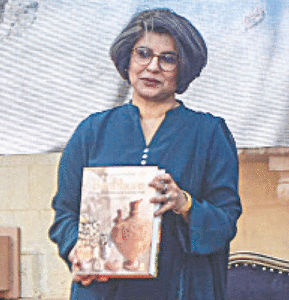
KARACHI: How and why a certain type of clothing came to symbolise the new secular Turkish national identity, and how this identity and the symbolic importance of dress associated with it have continued to shape the main parameters of political debates in modern Turkey was at the heart of Dr Sevgi Adak’s lecture on ‘Dressing the nation: clothing reforms and the secular national identity in Turkey’ at the Aga Khan University on Wednesday.
Part of the Institute for the Study of Muslim Civilisations Lecture Series, Dr Adak’s talk looked at two main interventions, namely the anti-veiling campaigns and the reform of religious clothing in the early Turkish Republic as clothing has been one of the most contested issues in modern Turkey, especially after the establishment of the republic in 1923 when dress codes became the battleground on which various actors came to debate the issues of religion, modernisation, secularism and gender roles in Turkish society.
Thereafter followed various anti-veiling campaigns. To research them, Dr Adak turned to Turkish newspaper archives that had records of such campaigns in some 62 cities of Turkey, including Trabzon, Eskisehir, Mugla, Rize, Mersin and Aydin. During the main wave of these campaigns in the 1930s there were also bans imposed on the pece (veil) and the carsaf (head to toe robe-like dress) to which many women responded with disobedience and open resistance, by avoiding the ban or hiding from the public eye as they went ahead with wearing their dress of choice.
‘In the 1930s, many women resisted bans on veil and carsaf’
Likewise, there were others who complied and happily embraced change.
“They used patriarchal pressure, they indulged in gossip about those who adapted to modern wear and against the government’s pushing for the undesired choice of attire, either they excluded themselves from social life and hid or they verbally assaulted or harassed those who wore the kind of clothes the government wanted them to wear,” she said. “Meanwhile, those who complied with modernity removed their veils and robes to opt for Western clothes. They also modelled and promoted modern dress,” she added.
“There were also some who decided to take middle ground as they gave up their veils but to cover their bodies they started wearing long coats or overcoats instead of their flowing robes. To cover their heads, they took to scarves,” she said.
“Still, there was never any law to force modern dress on women although there was one for male headgear or turban,” she said, while explaining that a government decree in Turkey in September, 1925 allowed the wearing of religious dress only for persons who held a recognised religious office. The law was amended two months later decreeing that anyone who wore the religious clothing reserved for the clergy would receive a jail term of three to 12 months.
Later, in 1934 there was the Dress Law prohibiting the wearing of religious dress by the clerics of all religions in the country except in places of worship and during religious ceremonies. “Therefore, outside of the performance of religious service, members of the clergy were to remove religious symbols and garments to adopt modern clothing,” she said. “The move was said to be a requirement [for] secularism and equality among citizens,” she added.
“Of course like many members of the clergy who happily complied, there were also some who were quite critical of the reform such as the Greek Church but Turkey tried not to let it affect their political relations as many Catholic priests and nuns also reacted to the law by leaving Turkey. But the Muslim clerics remained quite positive,” she said.
Another law, though it sounds rather odd, was a ban on the umbrella at the time. Dr Adak explains that it was because many women who had removed the veil had started hiding under umbrellas.
Published in Dawn, October 24th, 2019












































Dear visitor, the comments section is undergoing an overhaul and will return soon.